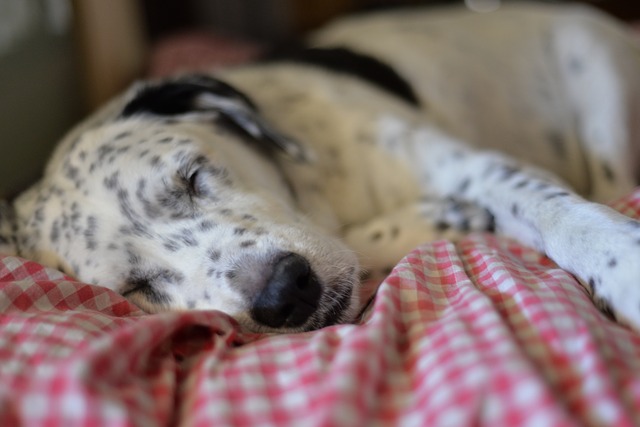
It’s a quiet night, but you are wide awake, listening to your senior dog pacing and panting. This isn’t just a one-off; it’s become a regular night-time ritual. If this is a familiar picture, you may be wondering what is going on to cause your dog’s shift in night-time behaviour. As dogs age, just like humans, they experience various changes that can impact their sleep patterns and overall behaviour at night. In this blog, we’ll explore the reasons why your senior dog may be restless at night, and discuss ways in which to help manage the behaviour.
What Causes Restlessness in Older Dogs?
There are several reasons why your senior dog may struggle to sleep at night. These include:
Medical Issues
Health problems commonly cause restlessness in senior dogs. Joint pain due to arthritis can make it tough for them to find a comfortable sleeping position. Canine cognitive dysfunction, akin to Alzheimer’s in humans, can cause confusion and anxiety, particularly during the darker hours. Additionally, bladder control issues can lead to discomfort and frequent waking.
Anxiety or Stress
Emotional factors play a significant role too. An older dog might feel anxious due to changes in their environment – maybe there’s a new pet in the house, or they’re missing a departed family member. These emotional upheavals can manifest as restlessness at night.
Sensory Decline
Ageing can dull a dog’s senses. Vision and hearing impairments can lead to disorientation, especially when the lights go out, making the night an unsettling time for your dog.
Change in Sleep Patterns
Just like senior humans, senior dogs can experience shifts in their sleep-wake cycle. This might mean they sleep more during the day and less at night, leading to more nocturnal activity.
How to Calm a Restless Senior Dog at Night
It can be distressing to know that your older dog is unable to relax at night, but there are things you can do to help manage their restlessness.
Consult a Vet
Your first step should always be to speak to a veterinarian. They can diagnose and treat any underlying medical issues that might be causing the restlessness. Treatments might include pain relief for arthritis or medications for cognitive issues.
Create a Comfortable Sleeping Area
An orthopaedic dog bed can be a game-changer for a senior dog with joint pain. Memory foam dog beds are a great option. Also, ensure their sleeping area is in a quiet part of the house to help them feel secure and undisturbed.
For more advice on creating a comfortable sleeping environment for arthritic dogs, read our blog.
Routine and Exercise
Maintaining a consistent daily routine can help regulate your dog’s internal clock. Gentle exercise, appropriate to their age and health, can also aid in making them more inclined to rest at night.
Calming Techniques
Soft music, a gentle petting session, or even pheromone diffusers designed for dogs can work wonders in soothing a restless dog.

Mental Stimulation
Keeping your dog’s mind active is crucial, especially for those with cognitive decline. Simple training exercises or interactive toys like KONGs, treat balls, and interactive feeders can keep your dog’s brain engaged and help ward off symptoms of cognitive dysfunction.

FAQs About Dog Restlessness at Night
Can diet affect my senior dog’s sleep?
Nutrition can play a crucial role in overall health and impact sleep quality. Consult your vet about the best diet for your senior dog, and read our blog on senior diets to learn how the nutritional needs of dogs change as they age. You could also consider supplements that support joint health and cognitive function.
Should I let my restless dog sleep in my bed?
This is a personal choice. Some dogs and guardians find comfort sleeping together, while others prefer separate sleeping spaces. Consider your comfort and your dog’s needs when making this decision.
Wrapping Up
Nighttime restlessness in senior dogs can be a complex issue, often stemming from a mix of physical, mental, and environmental factors. Understanding these reasons is the first step toward helping your dog find peace and comfort at night. Remember, your vet is an invaluable resource in this journey. By taking a compassionate and informed approach, you can greatly enhance the quality of life for your ageing canine companion, ensuring peaceful nights for both of you.
Struggling with your dog’s behaviour? Discover how Renee can elevate your wisdom and transform your relationship by visiting www.rplusdogs.com
